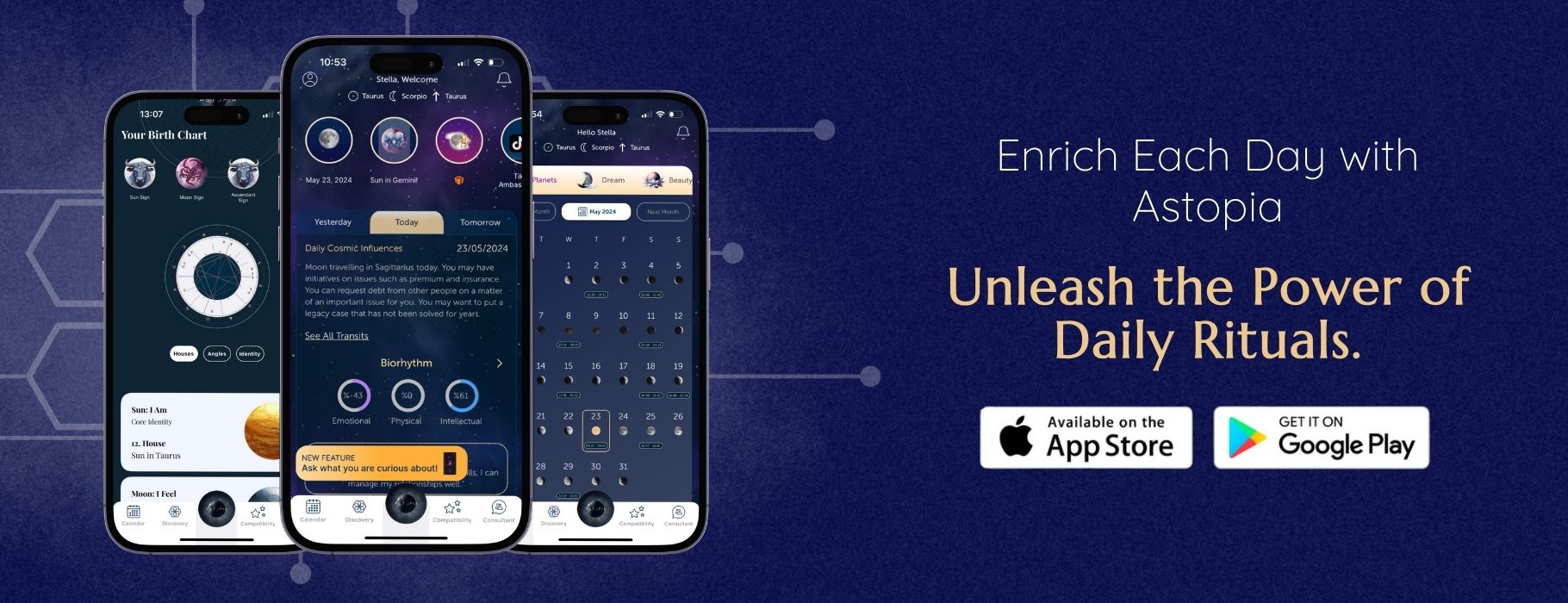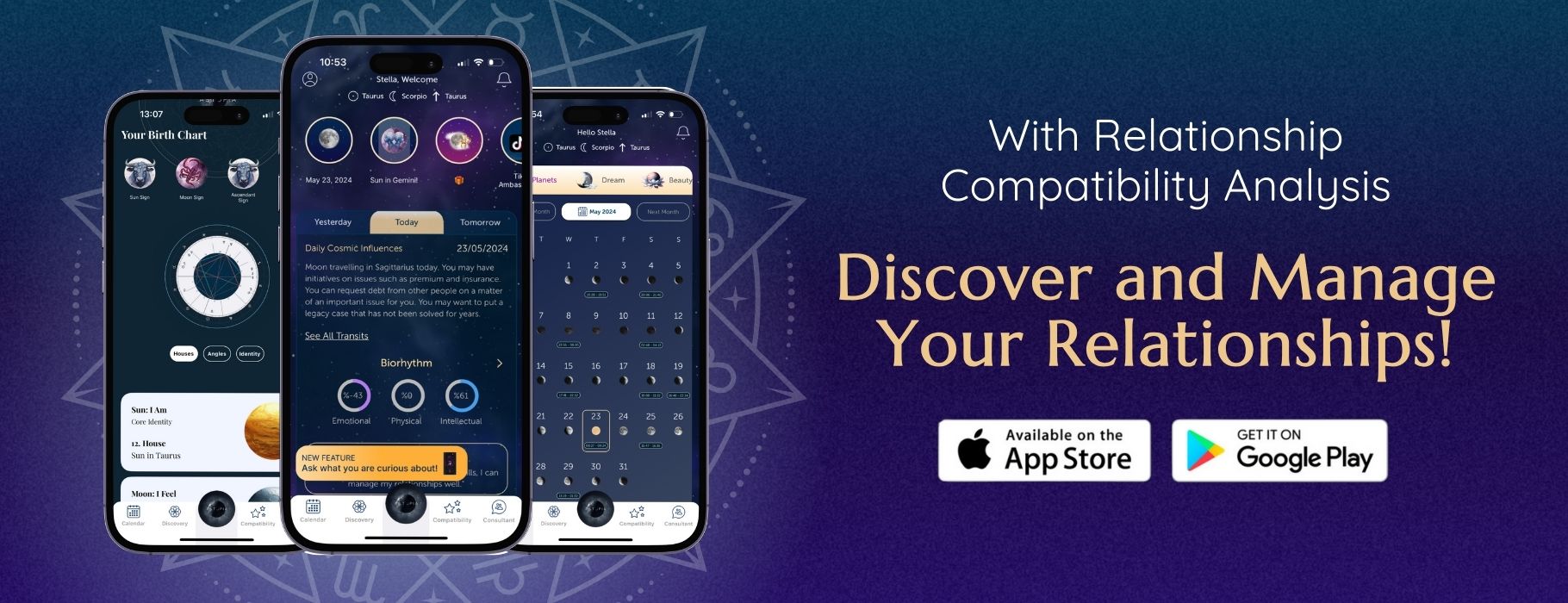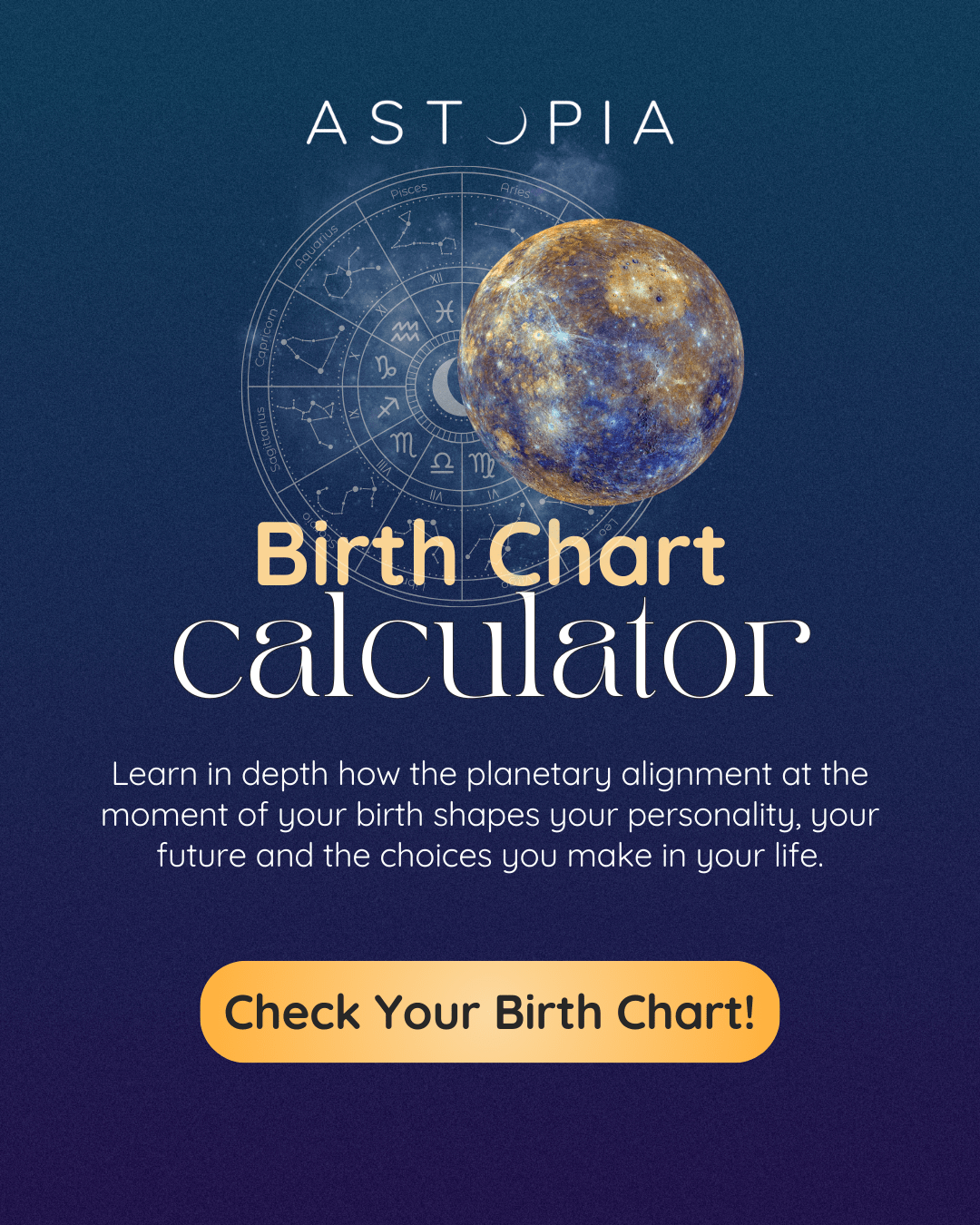
1/4/2024
Author: Astopia TeamThe Effects of Astrological Planets on Our Lives
Astrology follows the mysterious dance of stars and planets in the depths of the sky. This ancient science seeks to understand the effects of the planets in our Solar System on our lives. But how do these distant celestial bodies truly influence our existence? The answer lies in the complex yet fascinating world of astrology.
Astrology examines how the positions of celestial bodies can influence people's characters, emotions, and even fates. Understanding the meanings of astrological planets means delving into the depths of these interactions. Each planet represents a different aspect of life, and their placements offer clues about how they collectively affect us as a whole.
In this blog, we will deeply explore how planets are used in astrology, how each planet governs different zodiac signs, and the impact of these planets on our life paths.
Astrology and Planetary Usage
In astrology, planets are fundamental forces representing various aspects of life and influencing them in an individual's birth chart. Each planet is associated with a specific set of energies, qualities, and characteristics. Their positions, aspects, and interactions with each other form the basis of astrological interpretations.
Planetary Positions in the Birth Chart
- Birth Chart: A map of the sky at the moment of a person's birth. It shows the positions of the planets at that time and their distribution across the 12 zodiac signs. To access your birth chart and learn how to read it in detail, check out our Birth Chart page!
- Planetary Positions: The placement of each planet in the birth chart determines its role and influence in an individual's life.
- Aspects: The angles between planets (such as square, trine, opposition) determine how these energies interact and the impact they create in our lives.
Planets and Their Ruling Zodiac Signs
In astrology, each planet has a special relationship with certain zodiac signs. This relationship explains the influence of the planet's characteristic energies on those signs. A planet ruling a sign means that the planet's energies are most powerfully and purely manifested there. This can affect everything from individuals' personality traits to their lifestyles.
Planets and Their Governed Signs
- Sun - Aries: The Sun strengthens the sign's self-expression and individual identity development.
- Moon - Cancer: The Moon directs emotional responses, instincts, and the need for protection.
- Mercury - Gemini and Virgo: Affects intelligence, analytical ability, and communication skills.
- Venus - Taurus and Libra: Influential in love, art, beauty, and relationships.
- Mars - Aries and Scorpio: Has a strong impact on action, desire, and the fighting spirit.
- Jupiter - Sagittarius and Pisces: Directs expansion, optimism, and philosophical understanding.
- Saturn - Capricorn and Aquarius: Known for its effects on discipline, responsibility, and structure.
- Uranus - Aquarius: Influential in innovation, freedom, and uniqueness.
- Neptune - Pisces: Strong impact on imagination, intuition, and spiritual connections.
- Pluto - Scorpio: Influences transformation, power, and rebirth processes.
As the planets move, the signs they influence and the reactions they elicit change. To learn how the planets and signs they govern affect your life, don’t forget to follow Astopia's daily horoscope updates!
Importance of Ruling Planets
The ruling planet of each zodiac sign helps us understand the fundamental characteristics and energies of that sign. Ruling planets, through their positions in the personal birth chart, show the main themes, strengths, and weaknesses in an individual's life. They also explain how a sign's energies are expressed and reflected in life.
Astrology uses these deep and complex relationships to guide individuals in understanding their innate potentials and life paths. The planets and the signs they govern offer significant clues about how and where these potentials can best be expressed.
Each planet and the sign it governs in astrology signify which areas of life we are likely to navigate and how we can develop ourselves. This knowledge provides us with a unique perspective on our personal development journey.
The Significance and Meaning of the Sun in Astrology
In astrology, the Sun represents individual identity, the sense of self, and essential life energy. This bright star in a person's birth chart indicates the way they express themselves, their fundamental character traits, and their general path in life. The Sun is considered one of the most important planets in astrology as it symbolizes who an individual is and their core purpose in life.
- Core Personality: The Sun represents a person's nature, basic character, and ego. It forms the foundation of personality traits and how one reacts to the external world.
- Life Path and Purpose: The Sun expresses one's life purpose and role in the world. It indicates the path a person might take and where they have the potential to shine.
- Self-Expression: The Sun determines how an individual expresses themselves and their creativity. The position of the Sun shows how confidently and clearly one can express themselves.
- Life Energy: The Sun also symbolizes life energy and vitality. Its position provides insight into a person's overall health and energy levels.
The Astrological Importance and Meaning of the Moon
In astrology, the Moon is associated with the emotional world, instinctual reactions, and personal needs. It represents an individual's inner feelings, maternal traits, memory, and connection to the past. The Moon's position reveals how a person perceives emotional security and expresses their emotional responses. Astrology helps us understand a person's emotional makeup and inner world through the position of the Moon.
- Emotional Structure: The Moon defines a person's emotional responses and need for emotional security.
- Instincts and Intuition: The Moon is related to instinctual behaviors and intuitions. It expresses how a person reacts intuitively and uses their instincts.
- Family and Home Life: The Moon represents family relationships and the atmosphere at home. It shows how one relates to their family and the kind of environment they create at home.
- Past and Memories: The Moon determines the influence of past experiences and memories. It expresses how a person is affected by the past and how they hold onto memories.
The Meaning and Importance of Mercury
In astrology, Mercury is associated with mental functions, communication, intelligence, and learning abilities. This planet represents a person's way of thinking, processing and expressing information, as well as language and communication skills. Mercury governs the exchange of information, travels, and short-term movements. The position of this planet helps us understand how a person learns and interacts with the world.
- Mental Processing and Communication: Mercury expresses an individual's thinking style and communication abilities. It determines how we talk, write, and express our thoughts.
- Learning and Curiosity: Mercury directs learning processes and curiosity. It shows how we approach new information and assimilate it.
- Analytical Thinking: Analytical and logical thinking is a key characteristic of Mercury.
- Mobility and Travel: Mercury also governs short-term travels and daily movements. This can affect a person's mobility and interaction with their surroundings.
The Meaning and Importance of Venus
In astrology, Venus is associated with love, beauty, harmony, and relationships. This planet represents an individual's emotional expression, artistic inclinations, aesthetic understanding, and attitude in romantic relationships. Venus also impacts material values and pleasures, thus it is connected to financial prosperity and personal values.
- Love and Romantic Relationships: Venus directs love life and romantic relationships. A person's expression of love and the qualities they seek in relationships are influenced by Venus.
- Aesthetics and Art: Artistic talents and aesthetic tastes are within Venus's sphere of influence. Interest in art, beauty, and harmony is shaped by the energies of this planet.
- Material Values: Venus represents financial well-being and an individual's financial values. The importance placed on personal luxury and comfort varies depending on Venus's position.
- Social Relationships and Harmony: Venus emphasizes harmony and cooperation in social relationships. The pursuit of harmony and courtesy in interpersonal relationships stems from the influences of Venus.
Along with planetary influences and Venus traits, you can better understand your relationships with the Juno Calculator.
The Meaning and Importance of Mars in Astrology
In astrology, Mars represents action, courage, desire, and the spirit of struggle. This planet governs an individual's energy level, entrepreneurial spirit, competitive nature, and ways of dealing with conflict and struggle. The position of Mars indicates how a person takes action, achieves their goals, and faces challenges.
- Energy and Action: Mars determines personal energy and the ability to take action. It expresses how a person takes initiative and reaches their goals.
- Courage and Competition: Mars symbolizes courage and a competitive nature. It defines how a person responds to challenges and their way of struggling.
- Desire and Passion: Mars directs personal desires and passions. It shows what a person is passionately attached to and how they express these passions.
- Conflict and Struggle: Mars is known for its role in conflict and struggle. It expresses how a person deals with challenges and competition.
The Meaning and Importance of Jupiter in Astrology
In astrology, Jupiter is associated with expansion, abundance, luck, and optimism. This planet represents an individual's pursuit of growth, expansion, and abundance. Jupiter is also connected with higher education, philosophy, foreign cultures, and long-distance travel. The position of this planet indicates how expansion and optimism play a role in a person's life and in which areas of life they experience luck and abundance.
- Growth and Expansion: Jupiter directs personal and spiritual growth processes. It represents the areas of expansion and opportunities in a person's life.
- Luck and Abundance: Jupiter is associated with luck and abundance. It shows how these opportunities emerge in a person's life and how they are utilized.
- Higher Education and Philosophy: Jupiter is linked to philosophical thinking and higher education. It determines a person's worldview and approaches to education.
- Foreign Cultures and Travel: Jupiter relates to interactions with foreign cultures and long-distance travel. It expresses a person's desire to explore new places and experience different cultural experiences.
The Meaning and Importance of Saturn in Astrology
In astrology, Saturn represents discipline, responsibility, structure, and boundaries. This planet is associated with confronting life's challenges, as well as patience and endurance. Saturn signifies the obstacles, limitations, and mandatory lessons in an individual's life. Its position indicates how a person takes responsibility, how they withstand difficulties, and where they need discipline and boundaries in life.
- Discipline and Responsibility: Saturn guides personal discipline and responsibilities. It determines how an individual embraces taking responsibility and working diligently towards their goals.
- Limits and Obstacles: Saturn symbolizes the limits and obstacles in life. It expresses how a person copes with these challenges and overcomes them.
- Endurance and Patience: Saturn emphasizes endurance and patience in the face of hardships. It shows how an individual demonstrates resilience during tough times and learns to be patient.
- Life Lessons: Saturn directs the mandatory lessons and maturation processes in life. It represents pivotal moments and maturation experiences in an individual’s life.
The Meaning and Importance of Neptune in Astrology
In astrology, Neptune is associated with imagination, intuition, mysticism, and spirituality. This planet represents an individual’s dreams, imaginative power, intuitive abilities, and spiritual quests. Neptune's position shows how a person perceives reality and approaches life with a more mystical and intuitive perspective.
- Imagination and Creativity: Neptune signifies boundless imagination and creative expression. It reflects how a person uses and develops their artistic and creative talents.
- Intuition and Spirituality: Neptune is linked with intuition and spirituality. It indicates how an individual connects to their inner intuition and spiritual world.
- Dreams and Idealism: Neptune guides dreams, idealism, and utopias. It determines how a person follows their idealistic thoughts and dreams.
- Perception of Reality: Neptune expresses the perception of reality and how one relates to perceived reality. It shows how a person perceives reality and how this perception influences their life.
The Meaning and Importance of Pluto in Astrology
In astrology, Pluto is associated with themes of transformation, power, and rebirth. This planet represents deep psychological processes, hidden forces, and fundamental changes in life. Pluto's position shows how a person experiences profound transformations and the impact of these transformations.
- Transformation and Rebirth: Pluto guides personal transformation processes. It determines the significant changes in a person's life and how these changes are experienced.
- Hidden Power and Control: Pluto symbolizes hidden powers and the theme of control. It expresses a person's relationship with power and control and how these forces are utilized.
- Deep Psychological Processes: Pluto is linked to the subconscious and deep psychological processes. It reveals a person's subconscious motivations and psychological complexities.
- Renewal and Change: Pluto directs the processes of renewal and change arising from life's challenging aspects. It expresses how an individual transforms in the face of difficulties and the effects of this transformation.
Integrating Planetary Meanings into Life
Understanding the meanings of planets in astrology provides deep insight and guidance on our individual life journey. Each planet influences different aspects of our lives with its unique energy. Understanding and integrating these energies into our lives is essential for personal development and self-awareness.
Integrating Planetary Energies:
To integrate planetary energies into our lives, we must first understand these energies in our birth chart. Comprehending the role each planet plays in an individual's life allows us to use these energies consciously. For example, the placement of the Sun helps us understand how we express ourselves and our fundamental life purpose. Venus's position shows how we seek harmony and love in our relationships.
Astrology enhances our awareness of these energies, supporting our personal growth. The guidance of the planets contributes to holistic growth at mental, emotional, and spiritual levels. The challenges and opportunities we encounter in various areas of our lives can be more easily managed by understanding and harmoniously utilizing these planetary energies.
Evaluating the meanings and effects of the planets from a holistic perspective allows us to follow a more balanced and harmonious path in life. This knowledge helps an individual better understand themselves, their potential, and take more conscious steps on their life journey. In this sense, astrology offers us a powerful tool for exploring deeper meanings in our lives and realizing ourselves.
How Can I Learn the Daily Horoscope Comments of Planets Regarding Zodiac Signs?
If you're curious about astrology and wondering how to access daily horoscope readings of the planets, Astopia is just for you! Astopia offers in-depth information on daily astrological readings, planetary movements, and zodiac signs, satisfying your curiosity about astrology.
What Else Can You Find in Astopia?
- Birth Chart Analysis: Analyze your personal astrology chart in detail and learn about the effects of the planets in your life.
- Relationship Compatibility Analysis: Compare two individuals' birth charts to understand compatibility and potential challenges in relationships.
- Biorhythm Chart: Track your physical, emotional, and mental cycles with a biorhythm chart, and determine the best times for important decisions.
- Daily Horoscope Readings: Learn about the energy of each day and how planetary movements might affect you.
- Planetary Movements: Get information about the current positions of the planets and their astrological meanings.
These rich contents in Astopia are designed to support you on your astrology journey. To deepen your astrological understanding, contribute to your personal development, and benefit from the guidance of planetary movements in your daily life, download Astopia and start exploring now!
What Are Shadow Planets According to Astrology?
Astrology includes not only the physical planets of the Solar System but also certain special astrological points or 'shadow planets.' These shadow planets, despite not having a physical presence, play a significant role in astrological interpretations and cannot be overlooked in an individual's birth chart.
The Definition and Importance of Shadow Planets
Shadow planets traditionally refer to points that, while not having a physical existence, have astrological effects. This term is often used in Hindu astrology (Jyotish) for two points known as Rahu (North Lunar Node) and Ketu (South Lunar Node). In Western astrology, this concept is commonly applied to the Lunar Nodes and sometimes to other hypothetical points.
Rahu and Ketu (Lunar Nodes)
- Rahu (North Lunar Node): Rahu represents desires, ambition, and material gains. It shows areas of growth in a person's life and what they strive to achieve. Rahu also symbolizes curiosity for the unknown and innovative aspects.
- Ketu (South Lunar Node): Ketu signifies spiritual pursuits, past life experiences, and things that need to be relinquished. It expresses habits and attachments that should be let go of for personal development.
The interpretation of shadow planets in astrology plays a crucial role in understanding the challenges and opportunities faced in a person's life. The positions of Rahu and Ketu in a birth chart help us deeply understand an individual's karmic journey and spiritual growth. These points reflect both our past life experiences and future potentials.
How Many Planets Are There in the Solar System?
Astrology and astronomy have different approaches regarding the number of planets in the Solar System. From an astronomical perspective, there are eight planets in the Solar System, while astrology may view this number differently.
Astronomical Perspective
Astronomy recognizes eight planets in the Solar System: Mercury, Venus, Earth, Mars, Jupiter, Saturn, Uranus, and Neptune. Pluto was reclassified as a dwarf planet in 2006 by the International Astronomical Union.
Astrological Perspective
In astrology, Pluto still plays a significant role and is often considered a planet. Additionally, astrology regards the Sun and Moon as planets, so astrologically, there are 'ten planets' in the Solar System. Some astrological systems also take into account 'shadow planets' like Rahu and Ketu.
Astrological Houses and Planetary Rulership
In astrology, astrological houses represent different areas of life in a person's birth chart. Each house focuses on a different aspect of life, and the planets in these houses determine the energy and influences in these areas.
Meanings of Astrological Houses
1st House - Self and Personal Image
The 1st house represents your personal identity, outward appearance, and how you present yourself to the world. It's linked to your self-expression and initial interactions with people. Read more about the 1st house in the blog post.
2nd House - Material Values and Possessions
The 2nd house reflects your material resources, financial security, and things you value. Property ownership and money management are key themes of this house. Learn more about the 2nd house in the blog post.
3rd House - Communication and Immediate Environment
The 3rd house represents your communication skills, relationships with your immediate environment, and early education. It also covers short trips and relationships with siblings. Discover more about the 3rd house in the blog post.
4th House - Family and Home
The 4th house reflects your family life, roots, and inner security. Childhood memories, home, and family-related matters are the focus of this house. Explore the 4th house in the blog post.
5th House - Creativity and Romance
The 5th house represents your creativity, romantic relationships, and enjoyable activities. Love life, artistic talents, and matters related to children are the main themes of this house. Read more about the 5th house in the blog post.
6th House - Daily Routines and Health
The 6th house reflects your daily routines, work life, and health status. Physical and mental health, work, and service issues form the foundation of this house. Learn more about the 6th house in the blog post.
7th House - Partnerships and Marriage
The 7th house represents long-term relationships like marriage and business partnerships. It encompasses mutual connections, legal bonds, and open enmities. Discover more about the 7th house in the blog post.
8th House - Transformation and Shared Resources
The 8th house deals with transformation, rebirth, and others' resources. Inheritance, debts, and sexuality are the main topics of this house. Explore the 8th house in the blog post.
9th House - Higher Education and Travel
The 9th house represents higher education, long-distance travels, and philosophical thoughts. It reflects your worldview and spiritual beliefs. Read more about the 9th house in the blog post.
10th House - Career and Social Status
The 10th house reflects your career, social status, and life achievements. It determines your professional path and place in society. Learn more about the 10th house in the blog post.
11th House - Friendships and Community
The 11th house represents your friendships, social groups, and hopes for the future. It covers your role within a group and societal goals. Discover more about the 11th house in the blog post.
12th House - Spirituality and the Subconscious
The 12th house reflects your subconscious, spiritual pursuits, and isolated experiences. It's also associated with hidden enemies, karmic debts, and inner journeys. Explore the 12th house in the blog post.
Each house symbolizes a different aspect of life and life experiences. The planets in these houses influence events and experiences in these areas.
How Do the Planets Affect Astrology?
The planets are fundamental elements in astrology and their position in a person's natal chart plays a major role in that person's life. Each planet is associated with a specific energy and the issues it represents. The placement of these planets in signs and houses reflects an individual's personality traits, life experiences and potential.
The effects of the planets are examined during the natal chart analysis and interpreted how they influence various aspects of the individual's life. These influences shape the individual's character, relationships, career and other areas of life.
What are the Differences between Classical and Modern Planets in Astrology?
There are some important differences between classical and modern planets in astrology:
- Classical Planets: Sun, Moon, Mercury, Venus, Venus, Mars, Jupiter and Saturn. These planets have been the foundation of astrology throughout history and have represented the basic character traits and life experiences of the individual.
- Modern Planets: Uranus, Neptune and Pluto. These planets are more recently discovered and represent the deeper psychological processes of the individual and their impact on the social and collective level.
The discovery of modern planets has added a deeper and more complex dimension to astrology, allowing us to understand the interactions between the inner world of the individual and events in the external world from a broader perspective. Therefore, the inclusion of modern planets in astrology has allowed for more comprehensive and in-depth analysis on a personal and societal level.






